Story
What have marine zooplankton ever done for us? As it turns out, quite a lot.
17 August 2023
First full assessment of ecosystem services provided by zooplankton shows that by maintaining sustainable fisheries, reducing plastic pollution and minimising climate change, we will be actively investing in our ocean’s future and protecting human well-being.
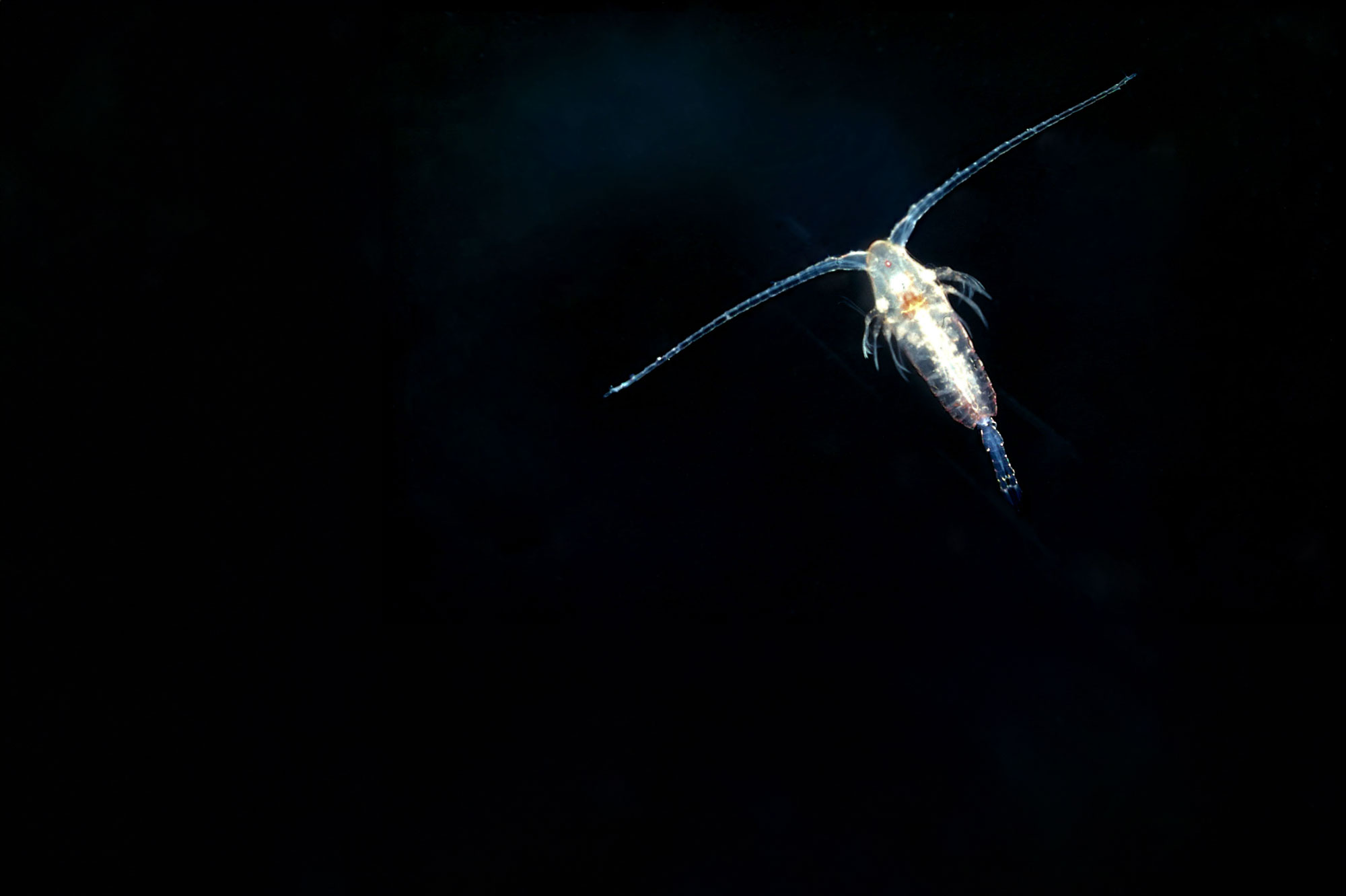 Marine ecosystems provide a multitude of benefits for people, including food, carbon storage, oxygen production and recreation, known as ecosystem services. However, these ecosystem services are at risk across the globe due to damaging human activities and ineffective management.
Marine ecosystems provide a multitude of benefits for people, including food, carbon storage, oxygen production and recreation, known as ecosystem services. However, these ecosystem services are at risk across the globe due to damaging human activities and ineffective management.Zooplankton, an important group of plankton that consists of tiny animals, jellyfish of all sizes and the larval stage of some marine species, are critical to the health and functioning of marine ecosystems and the benefits these ecosystems provide. Zooplankton are also directly involved with providing numerous ecosystem services themselves, such as underpinning marine food webs, aiding nutrient cycling and carbon sequestration.
As important as they are, zooplankton have only been partially studied, with previous ecosystem services research focusing on charismatic species, like marine mammals, or provisioning species, such as fish.
However, there are a plethora of stressors that zooplankton face, including climate change, ocean acidification, excessive nutrients, invasive species, microplastics, chemical and oil pollution, over-exploitation and underwater noise. Understanding the impacts of these stressors as well as the cumulative impact of multiple stressors is greatly needed.
A new study, led by scientists at Plymouth Marine Laboratory (PML) in partnership with the University of Plymouth, presents the first full assessment of ecosystem services provided by zooplankton, considered alongside pressures to their provision. The team focused on the three key stressors of climate change, microplastic pollution (low and high concentrations) and fisheries (commercial capture of target species), on three groups within the zooplankton - copepods, jellyfish, and krill. The analysis also includes a confidence assessment, indicating the certainty of the various ecosystem services and potential stressor impacts based on the available evidence.
The study, funded by the Natural Environment Research Council (NERC) through the EnvEast Doctoral Training Partnership, shows that the majority of stressor impacts on zooplankton ecosystem services are negative. Climate change and high microplastic concentration are evidenced to have the most substantial negative impacts on copepods and krill, with accompanying negative implications for ecosystem services such as climate regulation, water conditions, other materials and science.
High microplastic concentration also depressed ecosystem service provision for jellyfish, negatively impacting services such as the supply of genetic materials, climate regulation and water conditions. Fisheries are also evidenced to have negative impacts on all three zooplankton groups, however, areas where effective management practices have been implemented have proved successful in keeping populations stable.
Building on previous ecosystem services frameworks and other recent studies, the team developed a novel framework of ecosystem services provided by marine zooplankton. Both services (functions or properties of ecosystems that benefit and contribute to human well-being) and disservices (functions or properties of ecosystems that have undesired effects on human well-being) were included because both are important in understanding the wider implications of any management initiatives.
The study also shows that jellyfish are expected to increase in number in future climate change conditions so the services they provide, such as food, other materials and pest control, are likely to be positively affected. However, the jellyfish response to climate change is a small positive in a sea of negatives as potential ‘disservices’, mainly provided by jellyfish, are also likely to increase.
For all scenarios, the team visioned a future marine state and what this would mean for ecosystem services. This type of visioning exercise allows strategic thinking about the management of our marine resources, and where efforts should be invested to achieve the future that best serves humanity and the planet. The climate change scenario that estimates a 2-3°C of warming by the end of the century was applied, alongside a 38-41% increase in acidity of the ocean surface.
Dr Zara Botterell, lead author on the study, Postdoctoral Fellow at PML and Postdoctoral Research Associate at the University of Exeter, comments:
“Zooplankton are critical to the health and functioning of marine ecosystems and as a result provide numerous ecosystem services with accompanying implications for human well-being. However, we highlight that the anthropogenic stressors of climate change, microplastic pollution, and fisheries may reduce the provision of these important ecosystem services. Whilst in this study we assess each stressor individually, in reality these stressors will all be occurring simultaneously. Therefore, marine organisms will have to manage with the synergistic effects of multiple stressors. It could be that stand-alone stressors mean species are pushed to the edge of their tolerance threshold, but the combined impact of two or more pushes them beyond it.”
Prof. Nicola Beaumont, co-author and Head of Sea and Society Group at PML, said:
“Our extensive and novel analysis of zooplankton ecosystem services and stressors highlights important knowledge gaps. It will be crucial to fill these gaps if we are to understand the full implications of our changing climate and environment, and forecast how the ecosystem services that we all rely on may change.”
“Taking an ecosystem service approach is incredibly valuable to ground future ecosystem assessments in the context of human wellbeing. This approach can provide the wider evidence base, which is needed to ensure marine management is effective for both the environment and the humans which depend upon it.”
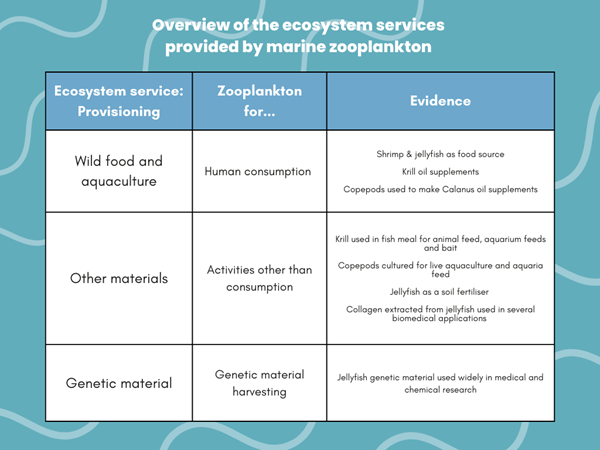
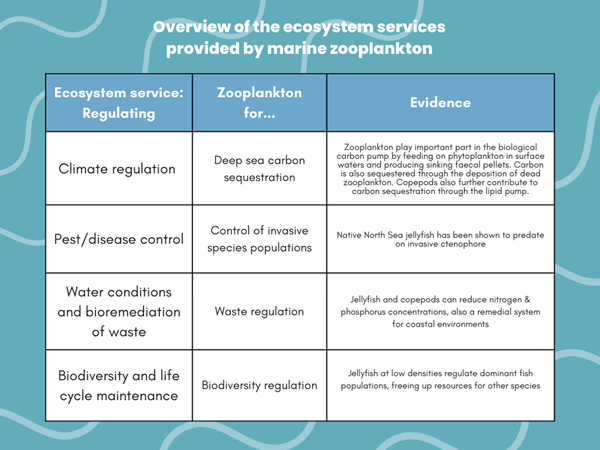
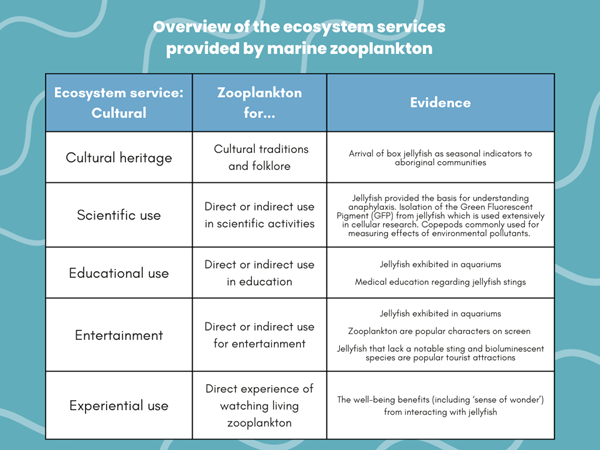
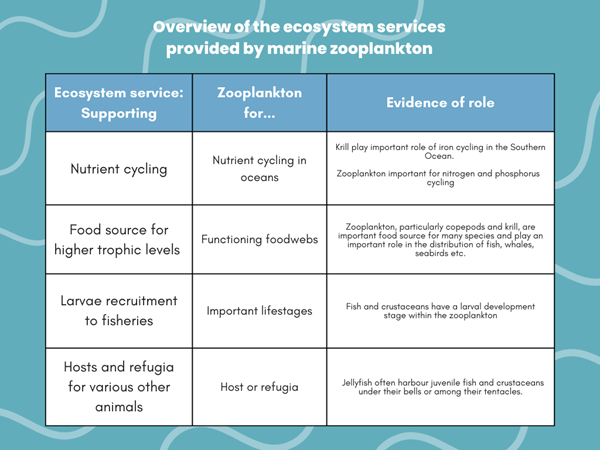
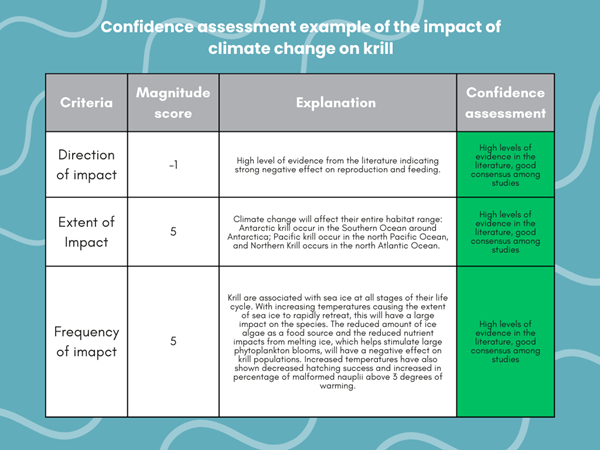
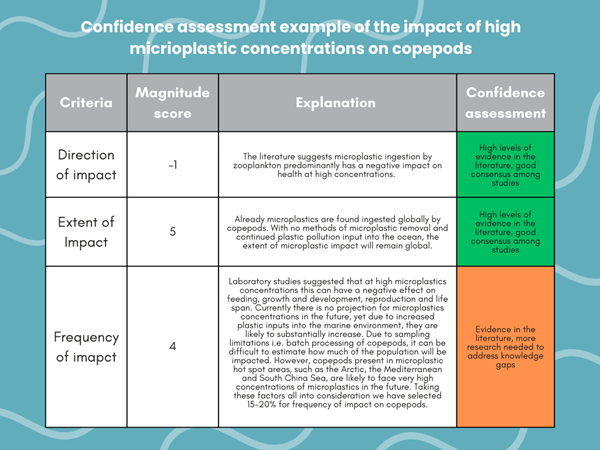
Related information
Full paper: An assessment of the ecosystem services of marine zooplankton and the key threats to their provision